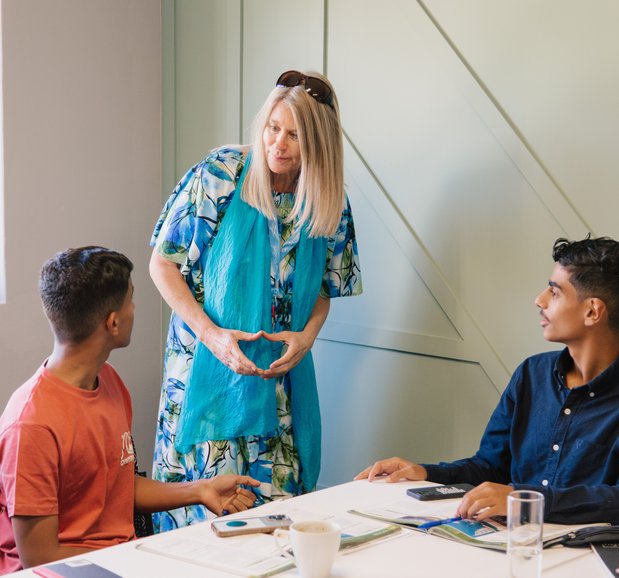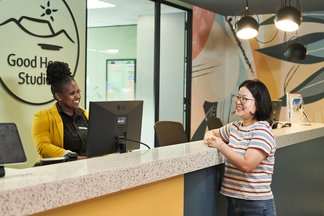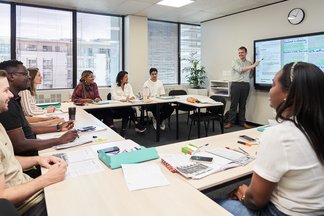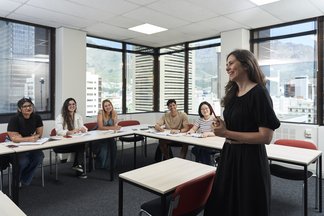Teacher Training
CELTA (Certificate in Teaching English to Speakers of Other Languages) is an internationally recognised teaching qualification for those with little or no previous teaching experience. This certificate can provide excellent job opportunities worldwide.
How to apply for CELTA
Qualification
Internationally recognised
Minimum age
18
Location
City Centre
Our Teacher Training Courses
Grammar Course
Good Hope Studies CELTA tutors have designed this Basic Grammar Course to clarify and formalise basic grammar knowledge so that candidates can start off the CELTA course with more confidence, be better equipped to teach grammar lessons, and be more successful with language analysis in lesson planning and in their assignments.
The overall focus on the CELTA course can thus be on improving teaching skills and not playing catch-up with grammar rules.
What to expect on the course?
- Clarification of the basics from nouns, gerunds, pronouns, articles, quantifiers, modal verbs and verbs to times and tenses.
- Three hours of asynchronous input (short, focused videos and quizzes to monitor your learning), so you can study at a time convenient to you and learn at your own pace on the learning management system, Canvas.
- Excellent content designed by, and support from, in-service Delta-qualified teachers.
- One Friday afternoon online tutorial where any of your questions will be dealt with in person.
Course layout
You will join a closed class online where the videos and quizzes are ready for you to work through.
Every Friday afternoon, you will have the opportunity to join our online tutorial where any of your questions will be dealt with and the course purpose and layout explained in detail.
Schedule
You have 2 weeks to complete the course at your own pace and at times that suit you.
CELTA Face to Face
The Certificate in Teaching English to Speakers of Other Languages (CELTA) is a TEFL (Teaching English as a Foreign Language) course administered by Cambridge English Language Assessment. In contrast to other TEFL courses, CELTA certification is recognised worldwide.
The CELTA course is recommended for anyone who wants to start teaching English as a foreign language at one of the many English language schools in Cape Town or abroad.
What to expect on the course?
- CELTA is the best-known and most widely obtained qualification in the field of English language teaching to adults. The course is designed and closely monitored by University of Cambridge English Language Assessment, and on passing the course, trainees receive a certificate from Cambridge as well as a report from the centre detailing the trainees’ areas of strength and weakness.
- The course is both practical and theoretical with extensive, closely supervised teaching practice followed by both written and oral feedback.
- Trainers are highly qualified and experienced, and approved by Cambridge.
- There is a maximum of 18 trainees per course, divided into two or three Teaching Practice (TP) groups.
Course layout
The face-to-face full-time course takes 4 weeks (Monday to Friday) and is a highly intensive and rewarding course. Candidates are required to attend daily from 08:30 until approximately 15:30 - although starting and finishing times may vary slightly.
Candidates are assessed on their teaching practice, lesson plans and written assignments. All preparation for lessons, as well as the written assignments, happens outside of course hours so applicants can realistically expect to put in 180 additional learning hours for pre-course preparation during evenings and weekends.
4 elements are key in the course:
- Input sessions including
- lesson planning;
- classroom management;
- methodology and lesson frameworks;
- language analysis from the perspective of a foreign learner.
- Teaching practice
Trainees do 6 hours (8 lessons) of assessed teaching practice over the 4 weeks. This is a key part of the course. The trainees split into smaller groups and teach foreign volunteer students. Trainees receive guidance from the tutors in planning their lessons, and after the lessons there is a group feedback session with oral feedback from other trainees and the tutor. The tutor also gives detailed written feedback on the lesson. - Observation of experienced teachers
Trainees observe a minimum of 6 hours of lessons taught by experienced, CELTA-qualified teachers, learning about a range of teaching styles and techniques as well as a range of teaching contexts. - Written assignments
Based on input and teaching sessions, these are a very practical assimilation tool used to reinforce skills and knowledge development.
CELTA Online

The Certificate in Teaching English to Speakers of Other Languages (CELTA) is a TEFL (Teaching English as a Foreign Language) course administered by Cambridge English Language Assessment. In contrast to other TEFL courses, CELTA certification is recognised worldwide.
The CELTA online course is recommended for anyone who wants to start teaching English as a foreign language at one of the many English language schools in South Africa or abroad.
What to expect on the course?
- CELTA is the best-known and most widely obtained qualification in the field of English language teaching to adults. The course is designed and closely monitored by University of Cambridge English Language Assessment; and on passing the course, trainees receive a certificate from Cambridge as well as a report from the centre detailing the trainees’ areas of strength and weakness.
- Our online virtual classroom on Zoom allows participants audio, video, text chat and screen sharing (standard tools in all online classrooms).
- Other techniques, such as dividing students into separate breakout rooms in order to do group work, are learnt to create more student-centred, communicative lessons.
- The course is both practical and theoretical with extensive, closely supervised teaching practice followed by both written and oral feedback.
- Trainers are highly qualified and experienced, and approved by Cambridge.
Course layout
The online course runs over 6 weeks and is highly intensive and rewarding with a very practical approach. A solid grounding is provided in teaching skills and techniques. Emphasis is placed on developing awareness and sensitivity to student needs and also on general language awareness.
Teaching practice and input sessions are held on Mondays, Tuesdays, Thursdays, and Fridays. Times are between 8:30 – 16:30 local time with scheduled breaks and slots to work asynchronously. These times may vary according to the timetable of the day. Wednesdays are Zoom-free days and time is set aside for candidates to work independently on lesson plans, asynchronous tasks, and assignments.
The first week will include training on how to use the different platforms used on the course so that once teaching practice officially starts in Week 2, candidates are confident and ready to teach with technology.
Candidates are assessed on their teaching practice, lesson plans and written assignments.
All preparation for lessons, as well as the written assignments, happens outside of course hours so applicants can realistically expect to put in 80 additional learning hours of coursework, undertaken in your own time, focusing on lesson planning and assignment research and writing. Key components include a minimum of 120 contact hours providing:
- Input sessions including
- lesson planning;
- classroom management;
- teaching theory;
- methodology and lesson frameworks;
- language analysis from the perspective of a foreign learner.
- Teaching practice
Trainees do 6 hours (8 lessons) of assessed teaching practice over the 6 weeks. This is a key part of the course. The trainees split into smaller groups in virtual breakout rooms and teach foreign volunteer students. Trainees receive guidance from the tutors in planning their lessons, and after the lessons there is a group feedback session, with oral feedback from other trainees and the tutor. The tutor also gives detailed written feedback on the lesson. - Observation of experienced teachers
Trainees observe a minimum of 6 hours of lessons taught by experienced, CELTA-qualified teachers through guided video observation, learning about a range of teaching styles and techniques as well as a range of teaching contexts. - Written assignments
Based on input and teaching sessions, these are a very practical assimilation tool used to reinforce skills and knowledge development. Four written assignments of 750 - 1000 words will be required, extensive feedback given and assignment support provided. - A self-maintained digital portfolio of all documents is required for course assessment
How to apply
Grammar Course: Those wanting to join our Grammar Course can book when applying for the CELTA course or by using our contact form.
Dates 2025: Any Monday
CELTA Face to Face: Participants are required to complete a pre-interview task and application form. They will then be invited to attend an interview and are required to complete a second task before they are officially accepted onto the course. An online interview for those not living in Cape Town can be arranged.
Dates 2025: 12 May - 6 Jun, 4 - 29 Aug, 3 - 28 Nov
CELTA Online: Candidates are required to complete a pre-interview task and may then be invited to attend an online interview, at which the candidate will immediately be told whether or not he/she has been accepted onto the course. The interview allows the centre to determine the candidate’s potential to pass the online course and allows candidates to get a clearer idea of what the online course involves.
Dates 2025: 15 Sep - 20 Oct
Some CELTA applicants may be advised to complete the online GHS Grammar Course first, in order to improve their chances of success on the course.
Candidates are required to have a level of English equivalent to Proficiency (C2) or high Advanced (C1).
For price details please contact us.
Please download, complete and email the following two forms to bookings(at)ghs.co.za:














